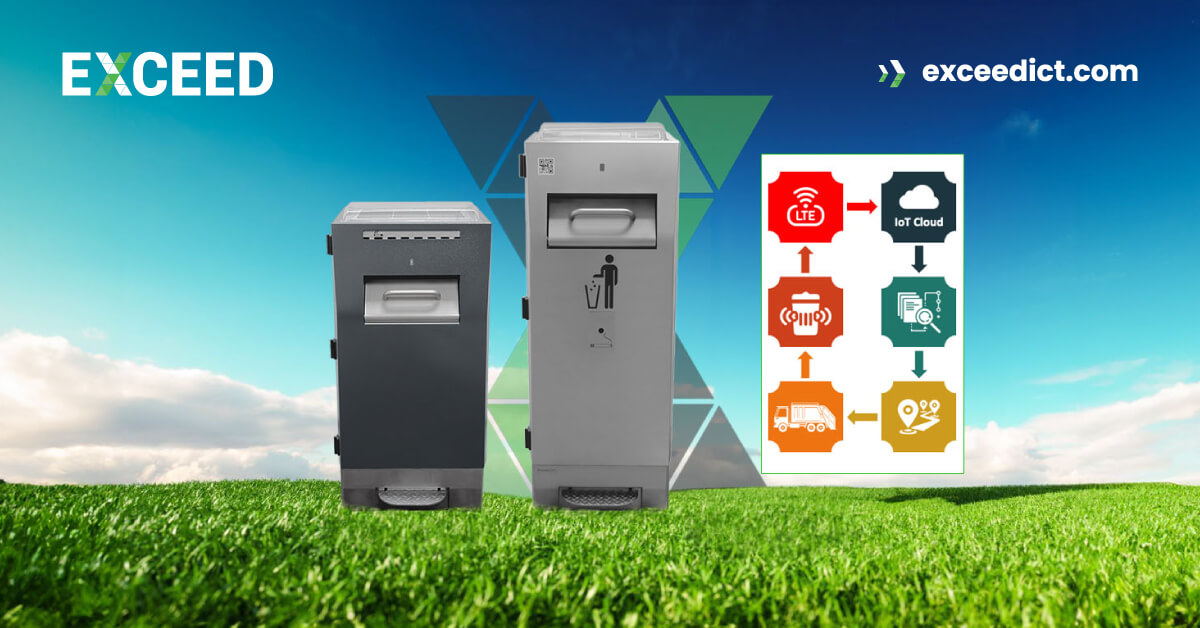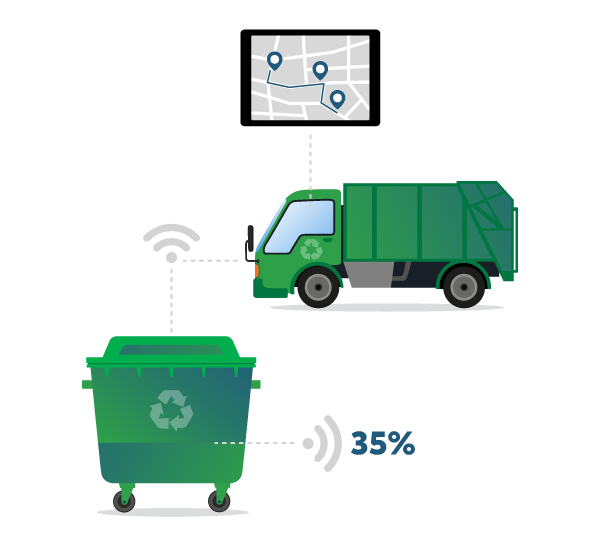
What is Smart Waste Management?

It’s not just a buzzword; it’s a paradigm shift towards a more efficient, sustainable, and environmentally conscious approach to handling waste. In an era where urbanisation is rampant and environmental concerns loom large, traditional waste management methods fall short in addressing the complexities of modern society. Smart Waste Management emerges as the solution, integrating technology, data analytics, and community engagement to revolutionise how we deal with waste.
Waste Management Challenges
Economic Challenges: Waste management incurs significant costs for municipalities and businesses alike. Disposal fees, transportation expenses, and infrastructure maintenance strain budgets, impacting overall economic efficiency.
Environmental Concerns: The indiscriminate disposal of waste pollutes land, water, and air, endangering ecosystems and human health. Traditional landfilling and incineration contribute to greenhouse gas emissions, exacerbating climate change.
Social Impacts: Inadequate waste management disproportionately affects marginalised communities, leading to environmental injustice. Improper waste disposal fosters unsanitary conditions, increasing the risk of disease outbreaks and reducing quality of life.
Importance of Smart Waste Management
Economic Benefits: Smart Waste Management optimises resource allocation, reducing operational costs and maximising revenue streams through waste-to-energy initiatives and recycling incentives.
Environmental Advantages: By leveraging technology for efficient waste collection, segregation, and recycling, Smart Waste Management minimises environmental pollution, conserves natural resources, and mitigates climate change.
Social Benefits: Community involvement and awareness are integral to Smart Waste Management, fostering a sense of responsibility and promoting sustainable behaviour among citizens.
Smart Waste Management Technologies
IoT Integration: Smart sensors embedded in waste bins enable real-time monitoring of fill levels, optimising collection routes and minimising operational inefficiencies.
Big Data Analytics: Data-driven insights empower waste management authorities to forecast waste generation patterns, allocate resources effectively, and implement targeted interventions.
Machine Learning Applications: AI algorithms analyse historical data to identify trends, predict future waste generation, and optimise waste processing operations for maximum efficiency.
Implementation Strategies
Public-Private Partnerships: Collaboration between government agencies, private enterprises, and civil society organisations is crucial for financing, implementing, and scaling up Smart Waste Management initiatives.
Regulatory Framework: Policy interventions, such as waste management regulations, taxation schemes, and incentives for sustainable practices, create an enabling environment for innovation and compliance.
Community Engagement: Public awareness campaigns, citizen participation platforms, and education initiatives empower communities to adopt responsible waste management practices and contribute to a cleaner environment.
Waste-to-Energy Initiatives: Innovative technologies, such as anaerobic digestion and incineration with energy recovery, convert organic waste into biogas or electricity, offering sustainable alternatives to traditional landfilling.
Future Trends
AI-Driven Waste Management Solutions: Artificial intelligence holds immense potential for revolutionising waste management, from predictive analytics for waste optimization to robotic sorting systems for recycling facilities.
Circular Economy Initiatives: Embracing the principles of the circular economy, where resources are reused, recycled, and regenerated, offers a holistic approach to waste management, minimising waste generation and maximising resource efficiency.
Smart Waste Sorting Technologies: Advanced sorting technologies, including optical sorting, magnetic separation, and robotics, enable precise separation of recyclable materials, enhancing the viability of recycling initiatives.
In conclusion, Smart Waste Management represents a paradigm shift towards a more sustainable and resilient future. By harnessing the power of technology, data analytics, and community engagement, we can overcome the challenges of traditional waste management and create a cleaner, greener planet for future generations.
FAQs
What are the key components of Smart Waste Management?
Smart Waste Management integrates technology, data analytics, and community engagement to optimise waste collection, processing, and recycling.
How does Smart-Waste Management contribute to environmental sustainability?
By minimising waste generation, promoting recycling, and reducing pollution, Smart-Waste Management conserves natural resources, mitigates climate change, and protects ecosystems.
What role does community engagement play in Smart-Waste Management?
Community involvement is essential for fostering a culture of sustainability, promoting responsible waste management practices, and ensuring the success of Smart-Waste Management initiatives.
Can Smart Waste Management help reduce waste disposal costs?
Yes, by optimising resource allocation, streamlining waste collection routes, and implementing innovative recycling solutions, Smart-Waste Management can significantly reduce waste disposal costs for municipalities and businesses.
What are some examples of Smart Waste Management technologies?
Smart sensors, IoT devices, big data analytics, and artificial intelligence are key technologies used in Smart-Waste Management for real-time monitoring, data analysis, and predictive modelling.
How can policymakers support the adoption of Smart Waste Management?
Policymakers can facilitate the adoption of Smart Waste Management through regulatory frameworks, incentives for sustainable practices, and public-private partnerships.
Interested in getting a smart bin for your home or neighbourhood?
Give us a call at 1300 832 639.
Our team is ready to assist you in selecting the perfect smart bin solution tailored to your needs. Whether it’s for individual households or community-wide waste management, we’re here to help make your environment cleaner and more efficient. Give us a call today to learn more about how smart bins can revolutionise your waste management practices.
Find Related Blogs
- Solar-Powered Smart Bins Now Crushing Waste In Lake Mac.
- Waste intelligence Solutions for Smart Cities.
- Waste Mate Smart Bin For Smart homes.
- Smart Bins for Home and Smart Cities in Australia.
Stay connected with EXCEED ICT
Stay connected with EXCEED ICT by joining our social networks (given at footer). Get the latest updates, news, and tips for enterprise device deployment. Follow us on Twitter, Facebook, and LinkedIn for the best enterprise device deployment solutions.
Help us to improve our enterprise by rating us on Google Maps. Your feedback and comments are valuable to us and will be used to make our services even better.



